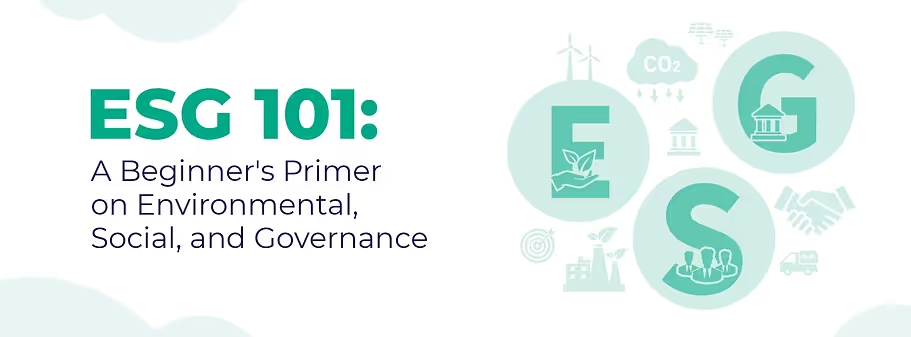
Solutions
Carbon Management
ESG Intelligence
Climate & Nature Risk
Data Registry
Beta
Sector
Get started, schedule a demo or request a free assessment!


In today's increasingly interconnected world, the way we do business is evolving. It's no longer just about bottom lines and quarterly profits. Consumers, investors, and employees are demanding more from the companies they support. They want to know that these businesses are operating sustainably, ethically, and responsibly. This is where ESG comes in.
ESG stands for Environmental, Social, and Governance. It's a set of criteria used to assess a company's commitment to these three core areas:
This pillar examines a company's relationship with the planet. The 'E' in ESG stands for Environmental criteria, focusing on a company's environmental impact. It examines how a business interacts with nature, addressing aspects like:
India, for instance, could lose $35 trillion in economic potential over the next 50 years due to unmitigated climate change, as per a report from Deloitte Economics Institute.
This pillar focuses on a company's impact on its stakeholders. The 'S' signifies Social criteria, which assess a company's relationships with its stakeholders, including:
A 2022 McKinsey & Company report stated that companies with diverse leadership teams have a 25% higher chance of outperforming their less diverse counterparts.
This pillar delves into a company's internal practices and decision-making processes. The 'G' stands for Governance criteria, which examines the company's leadership, management structures, and internal controls. Governance factors include:
By considering these three pillars, ESG provides a more comprehensive picture of a company than traditional financial metrics alone.
The rise of ESG is driven by a confluence of powerful forces:
The rise of ESG is driven by a growing awareness of the interconnectedness of our world. We are facing unprecedented challenges, from climate change and resource scarcity to social inequality and political instability. Businesses and organizations have a crucial role to play in addressing these challenges. By adopting ESG principles, companies can:
Companies that embrace ESG to gain a competitive edge, attract and retain talent, and build trust with stakeholders.
India's journey with ESG reporting has been one of steady evolution, transitioning from voluntary initiatives to a more robust, mandated framework. The initial seeds were sown in 2009 with the Ministry of Corporate Affairs' (MCA) "Voluntary Guidelines on Corporate Social Responsibility," followed by the National Guidelines on Responsible Business Conduct in 2019.
A significant turning point came in 2021 with the Securities and Exchange Board of India's (SEBI) introduction of the Business Responsibility and Sustainability Report (BRSR). This report mandated ESG disclosures for the top 1,000 listed companies, covering nine core principles encompassing environmental, social, and governance aspects.
While initially voluntary, the BRSR requirements became mandatory for the top 150 listed companies by market capitalization starting in the 2022-23 financial year. This marked a significant step towards enhancing transparency and accountability, pushing leading Indian corporates to integrate ESG considerations into their core strategies.
The year 2023 saw another major development with SEBI introducing the "Business Responsibility and Sustainability Reporting Core" (BRSR Core). This revised framework introduced stricter requirements, including "reasonable assurance" on reported ESG data, a first among global ESG regulations. This signifies India's commitment to setting high standards for ESG reporting and ensuring data accuracy and reliability.
As India's ESG reporting landscape continues to evolve, it's crucial to acknowledge the challenges. Data standardization, greenwashing concerns, and the cost burden for smaller companies remain hurdles to address. However, the increasing focus on ESG disclosures represents a positive shift towards India's more sustainable and responsible business ecosystem. With continued efforts from regulators, corporations, and investors, India is poised to play a leading role in shaping the future of ESG reporting on a global scale.
In conclusion, the adoption of Environmental, Social, and Governance (ESG) principles is no longer a choice but a necessity for businesses aiming to thrive in today's dynamic landscape. Companies that prioritize sustainability and ethical practices not only contribute positively to society and the environment but also secure long-term success and resilience in an increasingly conscious market.
The integration of ESG considerations requires commitment, innovation, and collaboration. As the world continues to evolve, the ESG framework serves as a compass, guiding businesses toward a future where profitability aligns harmoniously with environmental and social responsibility.

.svg)